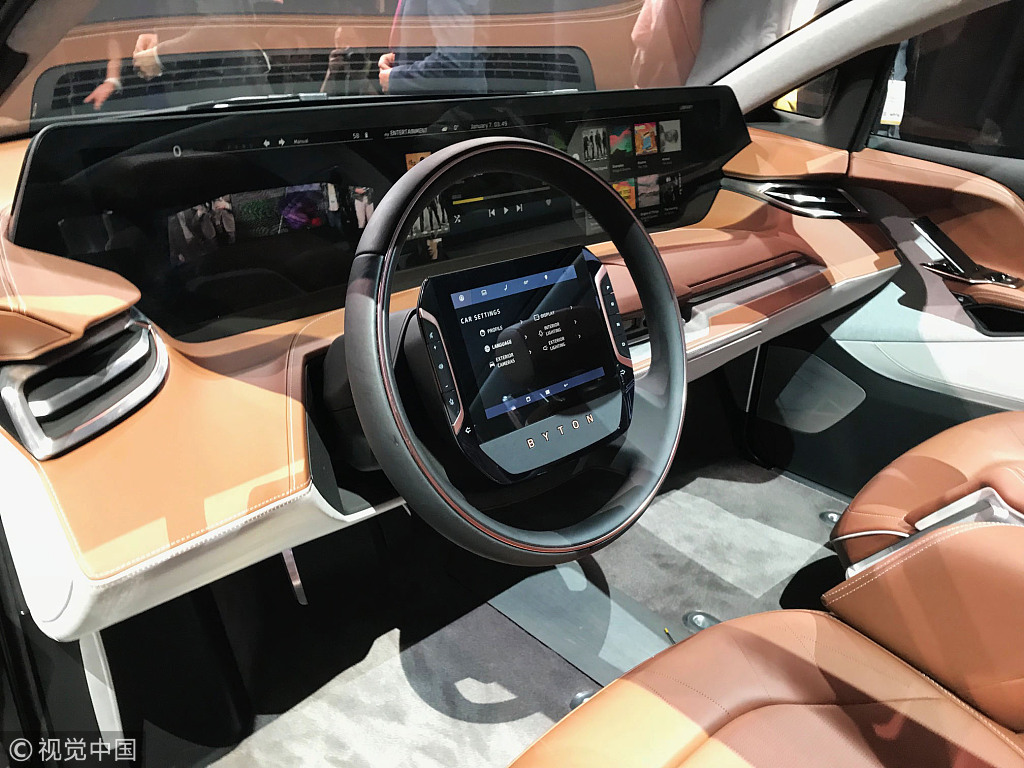Startups attract finance execs
By Hao Yan | China Daily | Updated: 2018-03-26 11:09

New energy rivals scramble for top talent and investors in race to mass-production success, Hao Yan reports.
Capital-intensive electric vehicle startups based in China are getting ready for overseas initial public offerings, expanding their teams with top investment banking executives who are deeply experienced in the global markets.
Industrial insiders said the entrepreneurial emerging automakers are offering generous packages to former investment banking executives as they prepare to launch IPOs in the United States.
"Automobile startups need related investment resources for future rounds of fundraising, since they are always in need of money," Cui Dongshu, secretary-general of the China Passenger Car Association, told China Daily.
Most recently, Byton hired former investment banker Charles Cheng as vice-president for capital markets and investor relations. Cheng previously served as managing director of Goldman Sachs Group's Chinese joint venture in Beijing.
A senior analyst at a national securities firm, who requested to remain anonymous, told China Daily that emerging carmakers usually offer generous stock rights and salary packages to attract senior investment banking professionals, as it is a necessary approach to ensure growth.
Securing funding is critical to the automobile startups' survival, as they must invest continuously for several years before having any products to sell and generating sufficient cash flow, according to the analyst.
The securities analyst estimated that 2 billion to 3 billion yuan ($317 million to $475 million) in investment is the normal amount required to build a plant and see mass-produced vehicles roll off the assembly line.

Byton set for B round
Byton's Series B funding round is set to be finalized in the next a few weeks, according to Carsten Breitfeld, CEO and co-founder of the automaker.
Breitfeld told a group of reporters on Saturday the company's fundraising is based on its achievements.
The Chinese electric-car startup completed its $240 million first round of funding in the second half 2017 and in January this year debuted its first concept car, which features facial-recognition technology and a 49-inch full-screen dashboard. The subsequent industrial prototype will go into production in Byton's plant in the coming two weeks, synchronized with the second round of funding.
"Trial production in the plant will be the basis for the round C global fundraising in the first quarter of next year," Breitfeld said.
Phase one of Byton's $1.7 billion plant in Nanjing, capital of eastern Jiangsu, is expected to be completed in 2019.
It will have an annual production output of 100,000 electric vehicles, with total annual capacity reaching 300,000 vehicles at completion, according to the company.
Cui of the CPCA said billions of yuan in investment might be enough to build a single plant, but is far from sufficient to run a long-lasting auto manufacturer.
"There are still huge risks hidden in establishing the assembling line, besides uncertainties in the niche market for premium electric car products," he said.
The securities analyst said those who outsource their production to conventional carmakers for an easier start will have to have their own plant sooner or later.
For example, Shanghai-headquartered Nio Auto, which initially contracted JAC Motors and GAC Motor to drive its production, plans to build a 3 billion yuan plant for the development and production of high-performance motors and electronic modules in Nanjing. The plant will have a production capacity annual output of 280,000 vehicles. Nio was the first China-based auto start-up to attract a renowned investment banking executive.
Louis T. Hsieh joined the team as chief financial officer in May last year. Previously, Hsieh joined New Oriental Education & Technology Group in 2005 as CFO and completed its IPO on the New York Securities Exchange in 2006.
Media reports in February said Nio had hired eight investment banks to help it prepare for an estimated $2 billion IPO on the NYSE.
Elsewhere, former J.P. Morgan Securities Asia Pacific's chairman of investment banking, Brian Gu, has taken on the role of vice-chairman and president of Xpeng Motors, a Guangzhou-headquartered electric car startup, according to a company announcement on March 1. He will lead the company's global strategy, finance, fundraising, investments and international partnerships.
Why the rush?
Cui said: "Startups are racing for pole position as the first Chinese electric-car startup to go public on the United States markets, for the largest initial public offering of its kind and to leave second-place in the dust.
"The entrepreneurs need more capital in their companies. Some of them will have to go public as soon as possible before the premium market turns them down."
But rushing onto the stock market is not in Byton's plan, as it aims to become a sustainable auto manufacturer that shoulders responsibilities and creates value for society, according to Breitfeld.
He said Byton is not building a company just for an IPO, but rather the company will go public when it is ready, and it is still preparing.
























